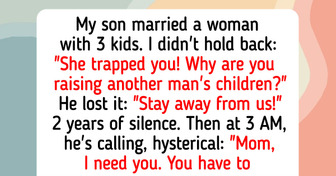Make her pay you rent and move them both to the basement make it into an apartment for them both
I Refused to Keep My Stepmom in My Late Dad’s House—I’m Not a Charity
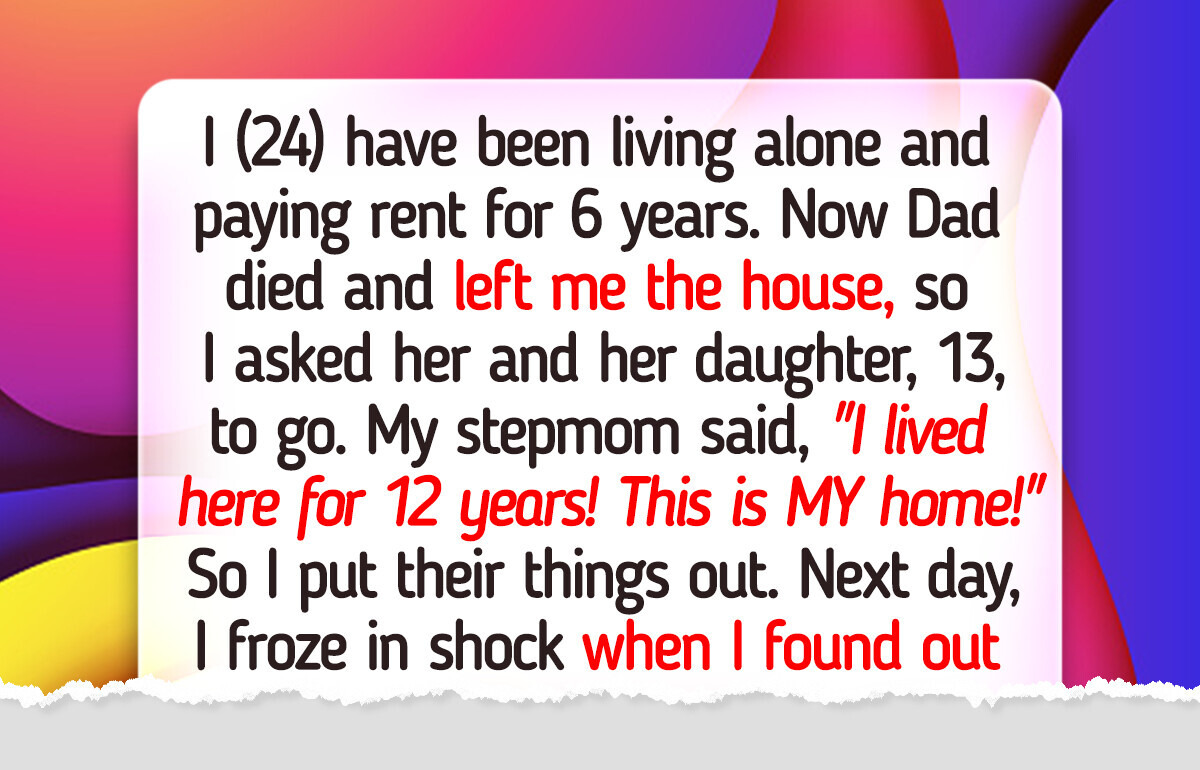
Inheritance battles often bring out hidden emotions, long-held grudges, and painful family truths. When property, loss, and loyalty collide, even the closest relationships can fall apart. These situations can spark fierce debates about what’s fair, what’s legal, and what’s right. One Bright Side reader recently wrote to us with a shocking story of inheritance, family tension, and an unexpected legal twist.
Harper’s letter:
Hi Bright Side!
My name is Harper and I am 24. I have been living alone in the city and paying rent for six years. Recently, it’s been getting harder and harder for me to afford the rising living costs.
But now, my dad has died and left me the house, so I asked my stepmom and her daughter (13) to leave so that I move in.
My stepmom said, “I’ve lived here for 12 years! This is MY home!” So I put their things out.
But the next day, I got a call from my dad’s attorney. I froze in shock when I found out there was another clause in the will—one I hadn’t seen.
According to it, the house isn’t just mine. It’s shared between me and my stepmom until she passes away. Only then would I become the sole owner.
Now, she and her daughter are moving back in. After all that’s happened, I honestly don’t think I can live with them.
My stepmom isn’t related to me—her only connection was through my father, and now that he’s gone, I don’t think she should have any rights. I am not a charity here!
Am I being unreasonable for feeling angry? Everyone in the family says that I was cruel for putting my dad’s wife and her child out, but I think that I am the one being treated unfairly.
—Harper

Harper, thank you for sharing something so personal. What you’re going through isn’t just about property—it’s about grief, shock, and a sense of betrayal from someone you trusted.
This isn’t a simple housing dispute; it’s the collision of legal reality with emotional fallout, family boundaries, and your fight for autonomy. Below are 4 very different directions you could take from here.
Pursue a mediation agreement to define boundaries and shared living terms.

How entitled can one person be? It was who's house? He was married to who? Who is the person questioning his wishes and of the people he loved. What a sad excuse of a human.
Since you’re now legal co-owners, and it’s clear you weren’t emotionally or logistically prepared to cohabitate, structured mediation could be key. You might feel betrayed, but your stepmom likely feels blindsided and displaced as well. A neutral third-party mediator—ideally one with experience in family estate disputes—can help you negotiate:
- Clear divisions of private/shared space
- Agreed-upon household responsibilities
- Quiet hours, guest policies, and rent/utility sharing if appropriate
This doesn’t mean becoming close or forgiving—it means protecting your mental peace in a legally binding way. It also allows you to regain a sense of control without escalating the conflict further.
Legally challenge the clause (if it was hidden or improperly disclosed).

To me these people are hating on you for no reason at all. Good for you kicking her out first place. Now since that entitled step person must be there.
Things need to change.
1: make her pay rent cause she can't stay for free.
2: make rules up between you two cause she is being rude to you and I'm caring so rules are needed.
3: don't listen to the mean people on here they don't know what you been thru and they have not walked in your shoes.
For you to be that old paying rent that long says you were put out at a young age.
She wants to stay there a basement. You've been with your dad far longer longer memories. These haters are being rude to you and don't get full situation.
Definitely you feel threatened rules are needed regulations are needed for both of them....
You are not going to be their maid their cook etc.
She wishes to act like this bills go in half.
And chores split between three of you.
Any issues she can always leave your home.
I get she's there til she croaks. But there are ways to make it not a battlefield . And you have say being an owner of the place nows your turn to finally take a stand and have a voice you didn't have before...
You were unaware of the co-ownership clause until after you took action based on the assumption of sole inheritance. That raises a legal red flag. If the will was not fully and transparently disclosed to you before you acted, consult a probate or estate attorney to explore if:
- The clause was improperly added or not disclosed by the executor
- There was undue influence involved in the drafting of the will
- The clause contradicts any prior written intentions your father shared
Even if the challenge is ultimately unsuccessful, just initiating it may lead to leverage in renegotiating the terms of living arrangements.
Move out and rent your share (if legally permissible).
If cohabiting feels unbearable—and your emotional health is spiraling—it may be worth exploring a complete pivot: move out voluntarily and treat your share of the house as an investment. With a lawyer’s help, you could:
- Rent your half of the property to someone else (if local law allows)
- Negotiate a payment from your stepmom for the exclusive right to live there
- Explore a buyout (now or over time), where she pays you for your share
This creates emotional and physical distance from the conflict while still honoring the legal realities.
Engage in a grief-centered family therapy session (even if just once).
Your emotional reaction isn’t just about property—it’s grief, loss, shock, and legacy. The timing of learning the truth (right after your dad’s death) made this ten times more volatile. Even if you don’t want a relationship with your stepmom or stepsister, consider initiating one single family therapy session focused on grief, loss, and betrayal. The goal is not reconciliation but:
- Airing unspoken resentments in a safe, guided space
- Understanding each other’s emotional realities (e.g., she lived there 12 years; you thought you’d earned the inheritance)
- Potentially releasing some of the anger that could otherwise poison your own healing
This approach might not change the facts, but it can help you reclaim your dignity and decompress the emotional bomb that just exploded.
Cynthia chose to exclude the stepmom who raised her from her wedding—simply to honor her biological mother’s request. Read her story and let us know: do you think she made the right choice?
Comments
You are lucky your stepmother hasn't taken you to court for what you have done. Traumatizing herself and her 13 year old daughter by trying to put them out on the street. I was living 4 states away when my Mother passed and she left her house to me with the understanding that her nephew and his wife who was living with her at the time could continue to live there rent free for as long as they wanted to. That clause was not hidden in the will in small letters it was very plain to see. I think you only seen what you wanted to see and your stepmother may see to it that you get nothing after what you did. That was cruel and should have never happened.
Agree the behaviour is immoral. You will eventually get the house until then have some respect for your dad's wishes.
What kind of cruel person throws their fathers wife and younger daughter out when she finds out she gets a house they still live in, not caring about their well-being or if they have anywhere to go and then have to audacity to be upset that they legally can stay there as they should be able to. Smh the entitlement here.
Harper,Harper,Harper,you have a heart of wickedness. For all you know,your stepmother might outlive..just be careful
Think of it this way, if your parents were still married he would leave house your mom. Then when she passed you and your sister would inherit. The way he did it he left you half and your step mom 1/2. Her 1/2 may end up with your step sister as well, depending on how it was left on the paperwork.
Related Reads
I Refused to Let a Family Tragedy Ruin My Wedding Day
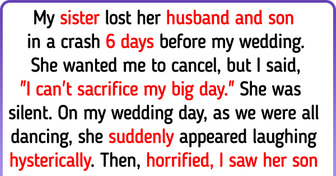
15+ Stories That Prove Moms’ Love Tank Never Runs Empty

I Refused to Be a Free Babysitter for My DIL’s Kids
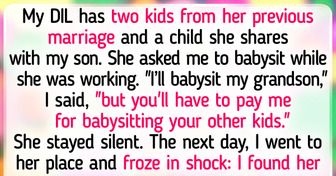
15+ Unforgettable Gifts That Made an Everlasting Impression

12 Moments That Teach Us to Stay Kind, Even When Life Becomes Heavy
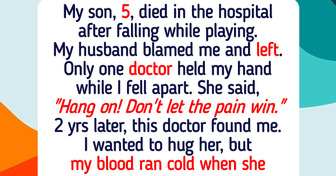
12 Moments Where Quiet Kindness Turned Strangers Into Family

15 Stories That Teach Us to Choose Kindness, Even When the World Goes Blind
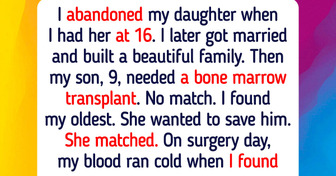
15 Moments That Inspire Us to Be Kind, Even When the World Turns Against Us
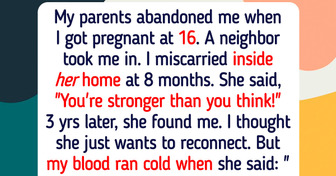
15 Moments That Show Kindness Is Quiet but Changes Everything

12 Life Moments Where Quiet Kindness Played the Main Role

I Funded My Wife’s Luxury Demands—She Made Me Regret Every Penny

16 Stories That Prove Kindness Still Wins in Our Broken World
